NASA’s Solar Dynamics Observatory (SDO) marked its 10th year in space in February 2020. The spacecraft has kept a constant eye on the Sun, studying how it creates solar activity and drives space weather, that impact the entire solar system, including Earth.
Here are a few highlights of SDO’s accomplishments since its launch on the outer space on February 11, 2010.
1. Fantastic Flares: SDO has witnessed countless astounding flares — giant outbursts of plasma released from the solar. In its first year and a half, SDO saw nearly 200 solar flares. Scientists said around 15% of the flares had a “late phase flare” that would follow minutes to hours after the initial flare. By studying this special class, scientists gained a better understanding of just how much energy is produced when the Sun erupts.
2. Solar Tornadoes: In February 2012, SDO captured images showing strange plasma tornados on the solar surface. These tornadoes were found to have been created by magnetic fields spinning the plasma. They could rotate at speeds up to 186,000 miles per hour whereas Earth tornadoes only reach speeds of 300 miles per hour.
3. Giant Waves: The churring sea of plasma on the solar surface can create giant waves that travel around the Sun at up to 3 million miles per hour. Scientists suspect these waves are driven by coronal mass ejections, which spew clouds of plasma off the surface of the Sun into the solar system.
4. Combustible Comets: Over the years, SDO has watched two comets fly by the Sun. In December 2011, scientist watched as Comet Lovejoy managed to survive the intense heating as it passed 516,000 miles above the solar surface. Comet ISON in 2013 didn’t survive its encounter. Through observations such as these, SDO has provided scientists with new information about how the Sun interacts with comets.
5. Global Circulation: Having no solid surface, the entire Sun is continually flowing due to the intense heat trying to escape and the rotation of the Sun. Moving about at the mid-latitudes are large-scale circulation patterns called Meridonial circulation. SDO’s observations revealed that these circulations are much more complex than scientists initially thought and are linked to sunspot production.
6. Predicting the Future: The Sun’s outpouring of material from coronal mass ejections, or CMEs, and the solar wind speed across the solar system. When they interact with Earth’s magnetic environment, they can induce space weather, which can be hazardous to spacecraft and astronauts.
7. Corona! Dimmings: The Sun’s wispy superheated outer atmosphere — the corona —sometimes dims. Scientists studying coronal dimming have found that they are linked to CMEs, the main drivers of severe space weather events that can damage satellites and harm astronauts. By linking coronal dimming to the size of CMEs, scientists hope to be able to study the space weather effects around other stars, which are too distant to directly measure their CMEs.
8. Death and Birth of a Solar Cycle: With a decade of observations, SDO has now seen nearly a
complete 11-year solar cycle. Starting near the beginning of Solar Cycle 24, SDO watched as the Sun’s activity ramped up to solar maximum and then faded to the current ongoing solar minimum. These multiyear observations help scientists understand signs that signal the decline of one solar cycle and the onset of the next.
9. Polar Corona! Holes: At times the Sun’s surface is marked by large dark patches called coronal holes where extreme ultraviolet emission is low. Linked to the Sun’s magnetic field, the holes follow the solar cycle, increasing at the solar maximum. When they form at the top and the bottom on the Sun they’re called polar coronal holes and SDO scientists were able to use their disappearance to determine when the Sun’s magnetic field reversed — a key indicator of when the Sun reaches solar maximum.
10. New Magnetic Explosions: At the end of the decade in December 2019, SDO observations enabled scientists to discover a whole new type of magnetic explosion. This special type — called spontaneous magnetic reconnection (versus previously observed more general forms of magnetic reconnection) — helped confirm a decades-old theory. It also may help scientists understand why the solar atmosphere is so hot, better predict space weather, and lead to breakthroughs in controlled fusion and lab plasma experiments. (Source: NASA)
Depending on the snow conditions, the vehicle’s lane is determined and adhered to with centimetre precision. In this way, the roadway is precisely cleared along gravel beds. The automated control of the clearing devices as well as the clearing strategies were developed in cooperation with the device manufacturer Aebi-Schmidt.
Extreme weather conditions affect the movement of people, production of goods and the delivery of vital supplies to different places. Winter is a particular challenge with so much snow to be cleared on roads and fields without compromising the safety of truck drivers.
 Thankfully, major companies in the land transport industry continue to innovate and offer solutions for the most pressing issues they face.
Thankfully, major companies in the land transport industry continue to innovate and offer solutions for the most pressing issues they face.
Two self-driving Mercedes-Benz Arocs in Immendingen in Germany is one innovation aimed at addressing snow-related problems during winter.
A joint project of Lab1886, the innovation unit for new business models within Mercedes-Benz AG, and Daimler Truck AG, the inventor of the truck, has now become a product that can be used as a solution for various customer requirements in sectors such as on-site logistics and agriculture.
Lab1886 and Daimler Trucks, together with Fraport AG, demonstrated the operation of self-driving snow-clearing vehicles in non-public closed areas for the first time in October 2017 as part of a pilot project on the site of the former Pferdsfeld air base. The in-house operation in Immendingen, which has now been started, is based on the findings of this project.
Self-driving Mercedes-Benz Arocs clear snow in Immendingen
Vehicles are being tested under extreme conditions at the new large-scale test site in Immendingen. For this purpose, the approximately 20 hectares of test areas must always be free of snow, ice and water. To ensure this every day at the start of the tests in the morning, two self-driving Mercedes-Benz Arocs are in use overnight. Trained specialists supervise the trucks on site.
Depending on the snow conditions, the vehicle’s lane is determined and adhered to with centimetre precision. In this way, the roadway is precisely cleared along gravel beds. The automated control of the clearing devices as well as the clearing strategies were developed in cooperation with the device manufacturer Aebi-Schmidt.
Automated snow removal is one of many applications of AXYARD, the technology product jointly developed by Lab1886 and Daimler Trucks.
The AXYARD technology
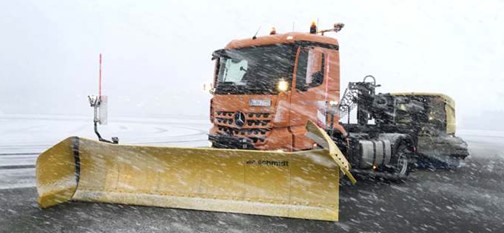 The name AXYARD stands for automated solutions (A=automated) that are used in various use cases (X) in closed terrain (YARD). AXYARD’s approach is to automate Mercedes-Benz trucks by equipping them with sensors and ECUs.
The name AXYARD stands for automated solutions (A=automated) that are used in various use cases (X) in closed terrain (YARD). AXYARD’s approach is to automate Mercedes-Benz trucks by equipping them with sensors and ECUs.
This allows them to complete predefined routes on closed terrain and be digitally conducted, monitored and orchestrated in a central control system – completely driverless.
“With AXYARD, we offer an innovative complete solution for commercial customers. We help them to optimize processes on their premises and to make their operations more efficient. The highlight of our new product is the wide range of applications of the technology: Whether in port and storage operations or in large-scale agricultural operations, to name but two examples, the use of AXYARD increases productivity,” said Susanne Hahn, Head of Lab1886 Global.
At the heart of AXYARD technology is the vehicle interface “Remote Truck Interface” (RTI): With the Remote Truck Interface (RTI), vehicle functions can be operated remotely and data can be exchanged. This also works in a network of several vehicles.
The vehicles are equipped with a high-precision GPS location (DGPS, differential GPS) and have state-of-the-art “vehicle-to-vehicle” communication (“V2V” communication). Due to the interaction of the innovative interface RTI as well as the control and remote control unit, an extremely fast and not least secure data exchange between vehicles and the infrastructure of the test site takes place.
To make this work in real time, a complete data exchange takes place every 0.1 seconds between the vehicles and the main control unit of the RTI.
Automated driving at Daimler Trucks
Dr. Christian Ballarin, Head of Advanced Engineering for Driver Assistance Systems, Autonomous Driving and Connectivity at Daimler Trucks: “We focus on two specific use cases for automated driving: regular use of the highway and motorway, as well as on journeys in cordoned-off areas, such as “gated areas”, e.g. with automated snow clearing vehicles on the site of the former Pferdsfeld air base and now on the test track in Immendingen or at the Brazilian sugar cane harvest.”
With regard to automated driving in regular motorway traffic, Daimler Trucks offers the Mercedes-Benz Actros, the Freightliner Cascadia and the FUSO Super Great as the world’s first manufacturer of semi-automated vehicles (SAE Level 2) ex-factory.
At the same time, the Autonomous Technology Group at Daimler Trucks is driving the development of highly automated trucks (SAE Level 4). The aim is to bring this technology into the series by the end of the decade. The testing on public highways in the USA, which started in autumn 2019, is an important step in this direction.
A wide range of applications from agriculture to logistics
Driverless systems have many advantages: Automation can increase productivity and save fuel. This makes them interesting for industries such as agriculture and logistics.
In addition to the use in the snow in Immendingen, automated trucks from Mercedes-Benz have also been reliably helping to harvest sugar cane in everyday use in the Brazilian sugar cane harvest since 2018. (Source: www.daimler.com)
With two-thirds of cargo destined for GCC states arriving at UAE seaports, the country’s maritime importance in the seamless movement of goods in the region has never been better.
H.E. Dr. Abdullah Belhaif Al Nuaimi, the UAE Minister of Infrastructure Development and Chairman of the Federal Transport Authority (FTA) for Land and Maritime, said the UAE continues to nurture major developments in the maritime sector and events like Breakbulk Middle East 2020 held in Dubai on February 25-26, 2020 is essential in spurring regional growth.
“As maritime is comprised of a number of components of the industrial supply chain, project development that stems from this year’s event will be vital for sustainable growth. The UAE currently accounts for 35% of investment in the maritime region, and we have invested over AED 157 billion into expanding local ports here,” Al Nuaimi noted.
“These efforts have been made in an attempt to bolster the entire Middle Eastern maritime infrastructure, and we look forward to seeing the steps that are taken in making this ambitious vision progressively come into fruition.”
Breakbulk Middle East 2020 drew the participation of 103 exhibitors and 1663 companies from 72 countries and welcomed more than 3,000 visitors, mostly decision-makers representing the Middle East’s cargo owners, government ministries, private sector oil & gas companies, global-scale EPCs, among others.
H.E. Eng. Ahmed Al Khouri, Director-General of the FTA for Land and Maritime UAE, commented at the opening ceremony, the UAE continues to advance world transport, particularly in the maritime industry.
“The industrial supply chain is extensive and Breakbulk Middle East has once again done a tremendous job of uniting and displaying its strength in full force. With the UAE fueled by our desire to strategically advance world transport and trade activity, feedback that is produced via interaction between key industry players will be invaluable,” he said.
Breakbulk Masters
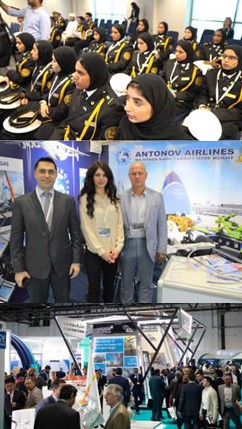 At this year’s BBME, Breakbulk Masters made its Middle East debut with major EPCs, manufacturers, and oil companies taking part such as ABB, Abengoa, ADNOC, AECOM, Andritz, Baker Hughes, Etihad Rail, Fluor, Gazprom Neft, GE Gas Power, Lamprell Energy, Linde, McDermott, Petrofac, Siemens, Sumitomo, TechnipFMC, Tecnicas Reunidas, Vallourec.
At this year’s BBME, Breakbulk Masters made its Middle East debut with major EPCs, manufacturers, and oil companies taking part such as ABB, Abengoa, ADNOC, AECOM, Andritz, Baker Hughes, Etihad Rail, Fluor, Gazprom Neft, GE Gas Power, Lamprell Energy, Linde, McDermott, Petrofac, Siemens, Sumitomo, TechnipFMC, Tecnicas Reunidas, Vallourec.
Organizers said Masters is an exclusive global network of senior project cargo players representing transport, logistics, and procurement professionals and freight owners. The goal is to bring them together with freight handlers and logistics service providers for learning and networking.
This year’s event also included a governmental panel titled “Regional Outlook and Growth Opportunities for the Breakbulk Industry” with major carriers and freight forwarders reporting upswings in demand for specialist freight handling services in the Gulf States and the wider Middle Eastern region.
“A wide-range of large-scale projects and investments are taking place within the Middle East. This pertains to oil and gas projects, increased interest in renewable energy and major infrastructure projects. In essence, cargo carrying contract opportunities are poised to keep rising throughout the region and this is highly beneficial for the UAE and entire GCC. Breakbulk Middle East provides an effective platform for industry leaders to align their objectives accordingly,” said Al Nuaimi.
The governmental panel is the first of its kind with topical issues like the Belt and Road discussed. Senior government officials from the region also addressed upcoming project opportunities to enhance the region’s capabilities and in turn, the collective breakbulk industry.
Women in Breakbulk
Keen to highlight the enormous contributions of women in the breakbulk industry in modern-day history, organizers also hosted a panel discussion for them where they shared their experiences and aspirations to make a difference in this male-dominated sector.
One of the panelists narrated how she managed to win over a significant market share in Bangladesh in the marine lubricant industry with hard work and dedication.
Another panelist shared how her company tossed in their full support to her work making her succeed. “Yes, you have a different mindset (as a woman) but you can do whatever you want,” she said.
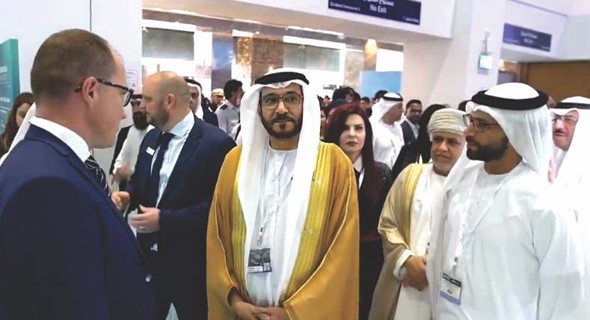 Organizers collaborated with WISTA (Women’s International Shipping & Trading Association) Arabia – UAE, an international networking organization that supports women at the management level in maritime and AWIMA (Arab Women in Maritime Association), an IMO (International Maritime Organization) mandated assembly focused on encouraging and empowering Arab women for the segment.
Organizers collaborated with WISTA (Women’s International Shipping & Trading Association) Arabia – UAE, an international networking organization that supports women at the management level in maritime and AWIMA (Arab Women in Maritime Association), an IMO (International Maritime Organization) mandated assembly focused on encouraging and empowering Arab women for the segment.
Speaking on this mutual cooperation, H.E. Eng. Hessa Al Malek, Executive Director of Maritime Transport at the Federal Transport Authority for Land and Maritime, and President of AWIMA stated, “The primary mission of AWIMA is centered around enhancing the national and regional recognition of Arab women as resources for the maritime industry. The UAE seeks to carry out a pioneering role among the countries of the world in all fields. Thus, ensuring the cultivation of female development within all industries, with a particular focus on maritime, is essential to support the country’s economy. Active contributions from key industry players at industry enhancing events such as Breakbulk Middle East will pay great dividends in the grand scheme of the country’s long-term goals.”
More and more companies are rooting for women in more senior roles in the once male-dominated industries like logistics, freight, air cargo and aviation. The contention is that they bring more productivity, diversity, thus, help push for more growth.
Nurturing talent
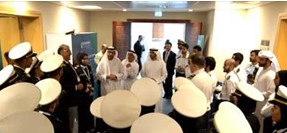 Organizers also gave 122 students and young professionals the opportunity to learn industry basics across a half-day session, then tour the exhibition floor as part of Breakbulk’s commitment to nurture talent at a grassroots level.
Organizers also gave 122 students and young professionals the opportunity to learn industry basics across a half-day session, then tour the exhibition floor as part of Breakbulk’s commitment to nurture talent at a grassroots level.
Helping their development was the Day’s third sessions “The Exciting World of Ship Chartering”, led by Fusion Academy of Excellence Director Krishnan Subramaniam where the attendees were offered the basics of chartering, career entry points, qualifications, certifications, and career paths for industry novices.
“The Education Day is a key feature of Breakbulk Middle East. It isn’t just for young up-and-comers either. Education never stops, so we’re proud to offer deep insights and best practice learnings from around the industry,” said the organizers.
One of the Education Day’s standout sessions was chaired by Captain Sahar Rasti, CEO of SJR General Group who shared her immense knowledge, aspirations, and experiences as the first Emirati Female Captain working in the maritime sector.
A key takeaway from Capt. Rasti’s talk was the importance of being self-motivated – something critical in such a patriarchal society like the Middle East. Breakbulk Middle East 2021 returns to Dubai on 9-10 February next year.
As the world continues to grapple against an invisible enemy, the novel Coronavirus (COVID-19), which has infected more than 1.7 million and killed over 100,000 as of early April, countless frontline health workers, along with those in certain industries like air cargo, take mounting risks to deliver vital health, food and other supplies for billions of people locked in this pandemic crisis.
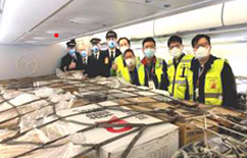 The World Health Organization (WHO) said new cases are still emerging in every country and territory across the world since the virus was first discovered in Wuhan, China more than three months ago, despite preventive measures that include locking down cities and even whole countries. This meant the supply-chains must keep going to sustain the needs of the world at this difficult time.
The World Health Organization (WHO) said new cases are still emerging in every country and territory across the world since the virus was first discovered in Wuhan, China more than three months ago, despite preventive measures that include locking down cities and even whole countries. This meant the supply-chains must keep going to sustain the needs of the world at this difficult time.
The International Air Transport Authority (IATA) said since the COVID-19 crisis began, air cargo has been a vital global partner in delivering much-needed medicines, vaccines, pharmaceuticals, medical supplies like ventilators, masks & PPE (personal protective equipment), mortuary body bags, medical equipment, including spare parts/repair components, medical oxygen, among others, to hospitals and clinics across the world to treat victims infected with the virus.
“We call on countries to work with companies to increase production; to ensure the free movement of essential health products; and to ensure equitable distribution of those products, based on need,” said WHO Director-General Tedros Adhanom Ghebreyesus at a media briefing after the G-20, which Saudi Arabia currently chairs, convened a teleconference recently.
Moving medical cargo is particularly crucial in Italy, Spain, France and the UK, which were all hit hard by the virus, straining their healthcare facilities and medical supplies to the maximum.
Italy suffered the worst worldwide with more than 17,669 deaths and over 139,422 COVID-19 cases as of early April. Its health services are on the brink of collapse, overwhelmed with patients. It recently received desperately needed doctors, supplies and equipment from China, Moscow and Cuba, which wouldn’t have been possible if air cargo flights were not allowed.
The United States, now the epicenter of the pandemic with more than 368,000 cases recorded as of the first week of April, is also struggling to cope with the pandemic that has caused food shortage, medical supplies and job losses for more than 10 million Americans.
An indispensable global partner
The air transport industry accounts for more than 52 metric tons of goods transported across the world in a given year. That’s about more than 35% of global trade by value but less than 1% of world trade by volume, which translates to some $6.8 trillion worth of goods annually.
These statistics dramatically fell this quarter with airline flights suspended across the world to prevent the spread of COVID-19. The pandemic’s disruption on the global supply chain also led to a fall in demand with deeper cuts on cargo capacity for freighter planes and lost belly-hold capacities for passenger flights.
“The situation of the airline industry remains grave. As you know, we have been working from a scenario of severe travel restrictions lasting for three months. That will cut industry revenues by $252 billion in 2020 compared to 2019,” said Alexandre de Juniac, IATA’s Director General and CEO, noting that the dimension of the crisis is beyond what the industry has experienced in the past.
While the cargo sector remains in operation, it’s struggling to meet demand due to restrictions on aviation rules that varies in different countries.
“The one part of the industry that continues to operate is the cargo sector. And it is struggling to meet demand. Passenger operations have been reduced so drastically that there is just not the capacity in the system to meet even the reduced levels of air cargo. And, as I have said before, this includes vital medical shipments on which people’s lives depend,” said De Juniac.
“Airlines are being creative in mounting cargo operations as charters and even using passenger aircraft. As we all know, aviation is a highly regulated industry. And on top of the “normal” process of obtaining traffic rights and landing permissions, in the current situation we were also seeing cargo crew being delayed by quarantine restrictions designed for commercial passengers,” he added.
Among the many issues that air cargo carriers face includes the ever-changing environment of travel restrictions and government orders that significantly challenge the movement of crew and the operation of freight flights itself.
EU clears roadblocks in Europe
Recognizing the importance of keeping the movement of goods despite the pandemic, the European Union had cleared “roadblocks” for air, land and sea cargoes.
EU President Ursula von der Leyen said the unobstructed transportation of goods is crucial to Europe, especially in this time of crisis, so the EU has issued practical advice to member states on the border crossing regulations involving freight carrying goods.
Emirates SkyCargo also had temporarily shifted all its cargo handling operations at Emirates SkyCentral DWC to Dubai International Airport (DXB) to streamline costs and operations effective 1 April.
“Additionally, in order to consolidate operations and reduce costs in this new scenario, we have also temporarily shifted all our cargo handling operations to Dubai International Airport (DXB). Taken together, we are making sure that we react more quickly to requests coming in from every part of the globe from our customers,” said Sultan.
Turkey & Turkish Cargo
Turkey is among countries reaching out to those deeply affected by the virus. It recently has health supplies to Italy and Spain, two of the worst hit nations in Europe, using a Turkish Military A-400M cargo plane.
Bosnia and Herzegovina were also assured by Turkey to receive medical and professional assistance, including support in the procurement of essential goods, as they fight the spread of Coronavirus.
Turkish Cargo, the country’s national air freight carrier, is also busy transporting essential goods and medical supplies across the country and elsewhere. It says it will deploy 155 flights per week for cargo freighters out of Istanbul in addition to 60 flights per week for passenger aircraft used for cargo operations.
Turkish Cargo says it intends to bridge the gap in the air transport industry amid the continued global travel ban to meet the world’s crucial demands for essential medical supplies and basic needs. The company is internationally certified to handle pharmaceuticals and life sciences and is known for its modern facilities and highly-trained personnel.
Several strong new measures were implemented in Turkey recently to curb the spread of the virus. Recep Tayyip Erdogan, the nation’s president, ordered a curfew restricting members of the public under age 20 (born after Jan. 1, 2000) from leaving their homes unless absolutely necessary.
He also announced a 15-day ban on vehicles leaving or entering 31 provinces, including Istanbul – home to nearly one-fifth of Turkey’s population – as well as the urban centers of the capital Ankara, Izmir, Bursa, and Adana while the wearing of face masks in crowded areas, including stores, is now mandatory, reported the state news media Anadulo Agency.
Erdogan announced over a billion Turkish liras (nearly $149 million) had been donated by over 300,000 people and institutions to Turkey’s national solidarity campaign within just three days to help those who need assistance. The president himself donated seven months of his salary to the fund.
Saudi Arabia vows to bounce back
With its economy hit by the double blow of the coronavirus pandemic and dramatically lower oil prices, the Saudi government unveiled in late March a stimulus package of 120 billion riyals ($32 billion) to keep businesses afloat amid the crisis.
 The country, which has nearly 3,000 COVID cases as of April 7, says the measures are designed to ensure the safety of its citizens and residents and to address the adverse financial and economic impact of both the virus and oil-price decline.
The country, which has nearly 3,000 COVID cases as of April 7, says the measures are designed to ensure the safety of its citizens and residents and to address the adverse financial and economic impact of both the virus and oil-price decline.
Saudia Cargo, the country’s national freight carrier, had since taken proactive steps to ensure the continuity of all cargo and supply operations, particularly in hauling much needed medical supplies.
UPS & other major US airlines
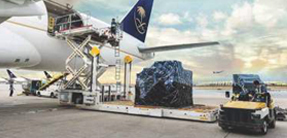 In the United States, President Trump’s Coronavirus task force has tapped UPS to work with the US Federal Emergency Management Agency (FEMA) and State health agencies as well as companies across the public and private sectors to deliver vital health supplies.
In the United States, President Trump’s Coronavirus task force has tapped UPS to work with the US Federal Emergency Management Agency (FEMA) and State health agencies as well as companies across the public and private sectors to deliver vital health supplies.
UPS Chairman and CEO David Abney said UPS Healthcare’s dedicated team with the company’s global network of public-private partnerships “are creating a powerful combination for rapid deployment of protective equipment and test kits throughout the U.S., and around the world.”
“UPS Healthcare has the expertise and experience to move vital, life-saving medicines, medical devices, diagnostic specimens and supplies everywhere they are needed,” said Abney as he announced the stepped up collaboration with FEMA to provide supply chain services for the agency’s distribution of PPE and necessary materials throughout the U.S., including respirators, N95 masks, and gloves for use by healthcare workers across America.
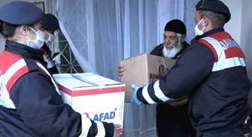 Apart from UPS, four other major passenger airlines – American, Delta, Southwest and United – have offered their services to bridge the gap in transporting medical supplies to the country as it grapples to fight the pandemic.
Apart from UPS, four other major passenger airlines – American, Delta, Southwest and United – have offered their services to bridge the gap in transporting medical supplies to the country as it grapples to fight the pandemic.
More than 432,000 Americans were already infected with COVID-19 as of early April with deaths totaling over 14,000. Health experts believe the pandemic could lead to more deaths and cases as it reaches its peak.
Airbus, Lufthansa Cargo & Europe
Airbus is also on a race to help in the fight against the COVID-19 pandemic. On April 3, an A350-1000 left Toulouse, France for Tianjin, China and returned to Hamburg the next day to deliver vital medical supplies.
The aerospace giant said it’s been conducting special missions related to the pandemic since mid-March, including deploying an A400M and its Beluga fleet to transport shipments of masks between its European sites in France, Germany, the UK and Spain.
“I would like to pay tribute to all the Airbus teams, globally, supporting the fight against COVID-19. They’re living our values in assisting those who are saving lives every day,” said Guillaume Faury, Airbus CEO, and vowed that Airbus will continue to support the fight against the Coronavirus pandemic wherever possible.
Apart from deploying its employees, their expertise and know-how and leveraging technology in the fight against the COVID-19 pandemic, Airbus has also started engaging in designing and manufacturing ventilators and 3D printed visors which are critical resources for hospitals.
France, one of the hardest hit countries in Europe, has ordered a billion face masks from China. The first batch landed in Paris on March 30 aboard the Russian flight carrier Volga Dnepr. Air France was also tapped to fly a portion of the shipment and so are other carriers.
French Health Minister Olivier Véran said France needs about 40 million face masks per week but it can only produce eight million on its own.
ECS Group, the global leader in the GSSA industry, meanwhile, paid tribute to the remarkable work of the teams at Global Services Handling (GSH), a French air cargo handling company based at Roissy Charles de Gaulle (CDG) airport in France.
“As in all sectors, we need to reorganize the way we work because of the crisis, with one further difficulty: remote working isn’t possible with goods handling. Our staff levels are down by around 25% but we are continuing to operate 24 hours a day, 7 days a week. We are 100% operational thanks to our extremely hard-working employees. Our priority is still to make sure that cargo leaves and arrives in total safety,” said Pierre Perez, GSH’s Managing Director.
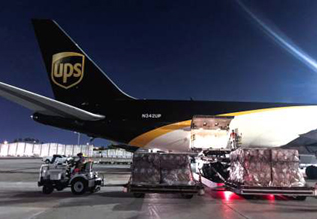 Airlines are doing everything they can to offer more capacity: increasing the number of all-cargo flights, converting passenger flights into freighters, demonstrating greater flexibility, and more – which makes handling agents’ vital players in ensuring the continuity of the supply chain. Without them, it would be impossible to receive and load cargo, which in turn would also make air freight forwarding impossible, Perez noted.
Airlines are doing everything they can to offer more capacity: increasing the number of all-cargo flights, converting passenger flights into freighters, demonstrating greater flexibility, and more – which makes handling agents’ vital players in ensuring the continuity of the supply chain. Without them, it would be impossible to receive and load cargo, which in turn would also make air freight forwarding impossible, Perez noted.
In Germany, Lufthansa Group utilized a passenger aircraft between China and Frankfurt to carry highly urgent goods, mainly medical supplies in an effort to stave off medical supply shortage due to the pandemic.
Lufthansa Cargo said the required permits for the flight were issued in excellent cooperation with the foreign ministries and embassies of the People’s Republic of China and the Federal Republic of Germany.
“Lufthansa Cargo is making every effort to strengthen security of supply by air. About half of the goods are normally transported in freighters, the other half in the bellies of passenger aircraft. Due to the far-reaching cancellations of passenger connections, valuable airfreight capacity is lacking. The Lufthansa Group and Lufthansa Cargo are therefore looking into the possibility of operating further flights exclusively for cargo transport on passenger aircraft,” Lufthansa Cargo said.
Middle East & Africa
Revenue losses are mounting in the Middle East & Africa with the continued travel ban amid the pandemic crisis.
Muhammad Al Bakri, IATA’s Regional Vice President for Africa and the Middle East, called on the governments across the region to step up efforts to help the aviation industry.
The United Arab Emirates, along with other countries in the region like Saudi Arabia, Rwanda, Morocco and Angola, have already offered stimulus packages and relief but Al Bakri said more is needed which include: direct financial support; loans; loan guarantees and support for the corporate bond market, and; tax relief.
“The air transport industry is an economic engine, supporting up to 8.6 million jobs across Africa and the Middle East and $186 billion in GDP. Every job created in the aviation industry supports another 24 jobs in the wider economy. Governments must recognize the vital importance of the air transport industry, and that support is urgently needed. Airlines are fighting for survival in every corner of the world,” said Al Bakri.
The IATA official said failure by governments to act now “will make this crisis longer and more painful.
“Airlines have demonstrated their value in economic and social development in Africa and the Middle East and governments need to prioritize them in rescue packages. Healthy airlines will be essential to jump-start the Middle East and global economies post-crisis,” he said.
“Some regulators are taking positive action. We are grateful to the Ghana, Morocco, the UAE, Saudi Arabic and South Africa for agreeing a full-season waiver to the slot use rule. This will enable airlines and airports greater flexibility for this season and greater certainty for summer. But there is more to do on the regulatory front. Governments need to recognize that we are in a crisis,” he added.
IATA is specifically asking governments to provide a package of measures to ensure air cargo operations, including fast track procedures to obtain overflight and landing permits, exempting flight crew members from 14-day quarantine, and removing economic impediments (overflight charges, parking fees, and slot restrictions).
The International Monetary Fund (IMF) said the world is heading to a deep recession this year and that countries must unite and help each other in this difficult times.
“First, the outlook for global growth: for 2020 it is negative—a recession at least as bad as during the global financial crisis or worse. But we expect recovery in 2021. To get there, it is paramount to prioritize containment and strengthen health systems—everywhere. The economic impact is and will be severe, but the faster the virus stops, the quicker and stronger the recovery will be,” said IMF Managing Director Kristalina Georgieva following a conference call of G20 Finance Ministers and Central Bank Governors in late March.
“The human costs of the Coronavirus pandemic are already immeasurable and all countries need to work together to protect people and limit the economic damage. This is a moment for solidarity…,” she noted.
COVID-19 Pandemic Impact in the Middle East and Africa
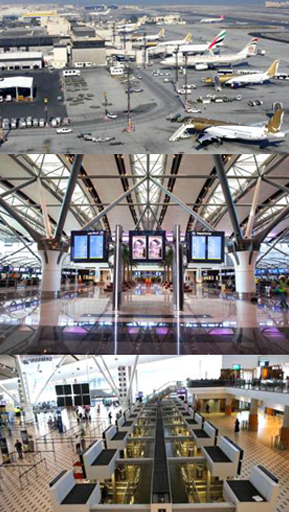 o Saudi Arabia: 26.7 million fewer passengers resulting in a US$5.61billion revenue loss, risking 217,570 jobs and US$13.6 billion in contribution to Saudi Arabia’s economy.
o Saudi Arabia: 26.7 million fewer passengers resulting in a US$5.61billion revenue loss, risking 217,570 jobs and US$13.6 billion in contribution to Saudi Arabia’s economy.
o UAE: 23.8 million fewer passengers resulting in a US$5.36 billion revenue loss, risking 287,863 jobs and US$17.7 billion in contribution to the UAE’s economy.
o Egypt: 9.5 million fewer passengers resulting in a US$1.6 billion revenue loss, risking almost 205,560 jobs and around US$2.4 billion in contribution to the Egyptian economy.
o Qatar: 3.6 million fewer passengers resulting in a US$1.32 billion revenue loss, risking 53,640 jobs and US$2.1billion in contribution to Qatar’s economy.
o Jordan: 2.8 million fewer passengers resulting in a US$0.5 billion revenue loss, risking 26,400 jobs and US$0.8 billion in contribution to Jordan’s economy.
o South Africa: 10.7 million fewer passengers resulting in a US$2.29 billion revenue loss, risking 186,850 jobs and US$3.8 billion in contribution to South Africa’s economy.
o Nigeria: 3.5 million fewer passengers resulting in a US$ 0.76 billion revenue loss, risking 91,380 jobs and US$0.65 billion in contribution to Nigeria’s economy.
o Ethiopia: 1.6 million fewer passengers resulting in a US$0.3billion revenue loss, risking 327,062 jobs and US$1.2 billion in contribution to Ethiopia’s economy.
o Kenya: 2.5 million fewer passengers resulting in a US$ 0.54 billion revenue loss, risking 137,965 jobs and US$1.1 billion in contribution to Kenya’s economy. Source: IATA
A walk into Ahmed Ismail Behbehani’s office is like going to a museum of sort with his massive collections of vintage and modern air planes as well as priceless historical photos.
His walls festooned with countless photos taken with heads of states, dignitaries, celebrities, global icons and even royalties like Queen Elizabeth, Prince Charles and the late Princess Diana on different times when they visited the tiny but oil rich country of Kuwait in the Middle East.
Behbehani is no doubt an influential man in his own right with privileged access to historical moments shaping the country’s political and economic relations with other countries across the world, which he rightfully earned after championing the cause to promote freedom of speech in Kuwait and promoting the country’s economic interest in neighboring markets in the region.
His media career began in 1979 at Kuwait University when he launched the academic community’s first campus paper. After earning his degree, he ventured into the newspaper industry but struggled to obtain a publishing license in Kuwait.
Determined to have an independent newspaper in Kuwait, Behbehani obtained a publishing license in London, have the paper printed in Bahrain and distributed the copies across GCC.
“They don’t give license to the media at that time so I got my license in London. We had the paper printed in Bahrain and then distributed the copies in the Gulf,” Behbehani, the editor-in-chief of the widely-read Al Khaleej Newspaper, shared to Air Cargo Update.
After his successful venture in the media, Behbehani was elected in Kuwait’s parliament and served the Kuwaiti people to the best of his abilities.
After trying politics, Behbehani decided to delve more into entrepreneurship and today owns one of the biggest high-end automobile dealership in Kuwait as well as a media and events company that produces aviation shows across the Middle East, mainly in Egypt.
The aviation shows that he produces resulted in a hobby of collecting different planes and models, some of them already considered vintage like the 52-year-old G2, a gift from a travel agency owner.
“My first plane was a toy which I got more than 40 years ago,” recalled Behbehani, the Chairman of the Organizing Committee of the Kuwait Aviation Show. “Today, I would say I have more than 576 planes, some of them are already vintage.”
Behbehani said he finds joy in collecting different aircraft and relishes the fact that aviation connects businesses, people and communities across the world.
“I love planes,” said Behbehani who is also into selling private aircraft.
The Kuwait Aviation Show 2020, under the patronage of HH Sheikh Sabah Al-Ahmed Al-Jaber Al-Sabah, drew thousands of people across Kuwait apart from connecting companies related to aerospace and aviation to potential investors and buyers.
Virgin Atlantic has teamed up with Virgin Group’s not-for-profit foundation, Virgin Unite, to fly a special charter flight from Shanghai to London, bringing in essential medical supplies and PPE equipment for the National Health Service (NHS).
The Boeing 787-9 aircraft operated the VS251 from Shanghai which departed at 11:40 local time on 3rd April landing at 16:50 on 3rd April into London Heathrow.
Manned by seven pilots and four cabin crew, the aircraft is carrying over 350,000 items of essential PPE supplies and medical equipment including respirators, ventilator parts, face masks, scrubs, aprons and eye protection in both the hold and in the cabin of the aircraft. These essential items will help keep NHS heroes working on the frontline safe and will support patients who are in great need.
Dominic Kennedy, Managing Director of Virgin Atlantic Cargo, commented, “We are incredibly grateful to the NHS for everything they are doing for the nation in extremely challenging circumstances, as they respond to the Covid-19 crisis. We’re pleased we can play a part in supporting them, by bringing crucial supplies into the UK. With special thanks to the British Embassy in Beijing, the CAA and the UK Government in expediting clearances to make this possible.”
“Despite a decrease in passengers travelling, demand to transport cargo remains strong, keeping global supply chains running and transporting essential supplies around the world. We’re looking forward to continuing to partner with the Department for Health and the NHS, working with them on a number of flights over the next few weeks, to bring in the supplies that the teams here in the UK urgently need to care for patients. Thanks also to Guy’s and St Thomas’ for their support in helping to organise this.”
Jean Oelwang, Founding CEO and President of Virgin Unite, the charitable foundation of the Virgin Group, added: “Millions of first responders, nurses, doctors, and other NHS staff are working tirelessly day and night on the frontlines of this crisis. They are true heroes in this crisis and we are humbled to have the opportunity to get this much-needed equipment to them.”
The emergence of Covid-19 has led to Virgin Atlantic operating cargo-only flights, a first for the airline since its launch in 1984. Special exemptions from the imposed travel restrictions for pilots and cabin crew – whose health and wellbeing remains our top priority – mean that cargo operations can continue, ensuring the airline can continue to support vital supply chains across the globe.
Every year, Virgin Atlantic transports over 200,000 tons of cargo on its global network. From pharmaceutical supplies to salmon sourced from lochs in Scotland, customers who have flown with the airline before will no doubt have been sitting above all sorts of goods and products being shipped around the world.
Virgin Atlantic is one of several Virgin Group companies supporting the NHS in its response to the COVID-19 outbreak. The airline’s highly skilled people have been approached to volunteer at several initiatives including the new NHS Nightingale Hospital, the London Ambulance Service, other NHS Hospitals and for the NHS Volunteer Responders.
Supporting the UK Government’s initiative to bring all UK healthcare distribution under one umbrella during the COVID-19 crisis, CEVA Logistics has brought in shipments bound for the NHS (National Health Service) on a specialist flight from Shanghai to London. Supporting the work of the charitable Virgin Foundation, a Virgin Atlantic B787-9 fully loaded with PPE (Personal Protection Equipment), virus testing tubes, goggles and ventilator parts landed at Heathrow Airport on Friday evening, bringing the much-needed supplies to UK frontline healthcare workers.
Worldwide shortages of specialist medical equipment and personal protective wear have resulted in huge demand for multiple items. In just seven days from receiving the first phone call to arriving at destination, CEVA’s teams in the UK and Shanghai worked together to bring almost 1,100 cartons of supplies on the special flight. Altogether there were 12,600 medical isolation goggles, 500 body bags, 30,000 filters for ventilators, 100,000 aprons, 10,000 sets of scrubs and 7,500 samples tubes for virus testing onboard.
Once unloaded from the 12-hour flight, the cargo transferred onto CEVA Logistics trucks, headed for its specialist healthcare facility in Dartford. From there the supplies will be distributed to NHS hospitals, surgeries and other facilities including, Guys and St Thomas’ Hospitals Trust in London.
Guy’s and St Thomas’ is among the UK’s busiest NHS Foundation Trusts and one of the largest in the country. Its supply chain team operate the largest hospital inventory system in Europe with a track record for innovation and service improvement. The Trust has an annual turnover of £1.5 billion and employs over 16,200 staff. Over the last year CEVA has worked to build a trusting relationship with GSTT, through which it not only develops a robust healthcare supply chain, but also supports GSTT focus on improving patient outcomes.
Special UK CAA (Civil Aviation Authority) permission had to be obtained by Virgin Atlantic to carry part of the shipment on the seats of its passenger cabin, with the rest of the cargo in the belly of the aircraft.
Says CEVA’s CEO, Mathieu Friedberg, “These medical supplies and PPE equipment are urgently required to support the work that NHS teams are providing up and down the country during the COVID-19 crisis. Our CEVA teams at both ends of the supply chain, alongside the Virgin team providing the uplift and the Virgin Foundation, have worked together tirelessly to make this become a reality in an incredibly short timeframe.”
Steve Buckerfield, director sales, Cargo at Virgin Atlantic, adds, “We’re proud to have joined forces with the CEVA Logistics teams in Shanghai and London to expedite this urgently-needed shipment of medical equipment to the heroes working in the NHS. At a time when frontline doctors and nurses are working so hard to save lives, it’s essential they have the supplies they need to stay safe and to protect patients in their care.
“With medical supplies being sourced from around the world, the air cargo and logistics industries have a vital role to play in making sure equipment reaches where it is required safely and immediately to help save the lives of patients and reduce the spread of COVID-19. I also want to say a massive ‘thank you’ to the Virgin Atlantic team who enabled us to complete this special flight for the NHS so quickly and efficiently.”
The trade association that represents the companies that handle the supply chains for much of the UK’s visible international exports has welcomed the news that exporters are going to get additional support from the government. The British International Freight Association (BIFA) welcomes the additional support that the Department for International Trade (DIT) is making available to 160,000 UK exporters and international investors.
BIFA Director General, Robert Keen says, “We understand that UK businesses are now eligible to secure export insurance cover to major international markets, in addition to export finance, to keep trading during the coronavirus outbreak.
“We also understand that DIT is ready to provide assistance with customs authorities to ensure smooth clearance of businesses’ products, and to offer advice on intellectual property and other issues with business continuity.
“These are the sort of initiatives that can support international exports and are welcome news for BIFA members, which as freight forwarders, are responsible for the logistics services that underpin much of Britain’s visible domestic and international trade.”
The DIT says that UK businesses will now be eligible to secure export insurance cover to markets including the EU, US, Japan, Australia, New Zealand, Canada, Iceland, Norway and Switzerland with immediate effect, following UK Export Finance expanding the scope of its Export Insurance Policy (EXIP).
Keen added: “This follows the news that the government will waive import taxes on medical equipment crucial to the fight against coronavirus, much of which is shipped by BIFA members.
“If UK exporters are protected, that should have a knock on effect on the freight forwarders that many exporters rely upon to provide logistics services.”
Saudi logistics and transportation giant Bahri has donated $2.7m to the kingdom’s fight against the spread of coronavirus.
The company’s board of directors recently approved the donation to Saudi Arabia’s Ministry of Health and has also placed its maritime fleet, logistics services and offices at the disposal of the ministry.
Mohammed Abdulaziz Al-Sarhan, chairman of Bahri, said, “Underlining its social responsibility commitment to cooperating all entities in the kingdom to strengthen the national efforts and support the government during this period, Bahri decided to donate SAR10m ($2.7m) to back the initiatives of the Ministry of Health to contain the outbreak.”
Al-Sarhan revealed that operations are continuing as normal, despite global lockdowns and increased restrictions, although he stressed that all necessary precautions had been taken in order to ensure the safety of staff at the company’s offices and onboard vessels.
There are currently 1,453 confirmed cases of Covid-19 in Saudi Arabia, where the virus has claimed the lives of eight people.
Dubai Airport Freezone Authority (DAFZA) made a 12% contribution to the emirate’s foreign trade in 2019, compared to 11.2% in 2018, out of a total trade value of Dh1.37 trillion recorded last year.
DAFZA’s foreign trade exceeded Dh164 billion in 2019, compared to Dh146 billion in 2018, with a 12.6% growth.
This was driven by more than 15.8% growth in imports worth Dh72.4 billion. There was Dh91.8 billion in total exports and re-exports with 10.2% growth, allowing DAFZA to achieve a Dh19.4 billion trade surplus in 2019.
India was DAFZA’s biggest trade partner in 2019 with 18.3% valued at Dh30 billion, followed by China with 17.3% at Dh28.4 billion. Switzerland was third with 16.3% at Dh26.8 billion.
In terms of imports, India ranked first with 40.7% at Dh29.4 billion, followed by China with 39.2% at Dh28.4 billion. Switzerland ranked first in exports and re-exports and accounted for 27.4% at Dh25.1 billion, followed by Iraq with 12.3% valued at Dh11.3 billion.
In terms of goods, machinery and electrical and electronics equipment ranked first with 55% of the total foreign trade in 2019, with a value of Dh37.4 billion for imports and Dh53 billion for exports and re-exports. This was an increase of 14.3% or Dh11.3 billion in DAFZA’s total trade.
This was followed by precious stones and metals with 38% of the total import value at Dh29.6 billion and Dh32 billion in terms of exports and re-exports. This meant an increase of 10.4% worth Dh5.8 billion. Both sectors represent 92.6% of DAFZA’s total trade.
In 2019, DAFZA’s total revenues of multinational companies increased by 36.6% compared to the same period in 2018. The total space occupied by multinational companies increased by more than 135%.
HE Dr Mohammed Al Zarooni, director general of DAFZA, said, “DAFZA is one of the most attractive destinations for global companies of all sizes and sectors looking to work within a safe and flexible investment environment that can keep pace with different economic trends and fluctuations.
“DAFZA succeeded due to its well-designed plans that ensure ease of business and better-controlled operations that match the requirements of various business sectors.”